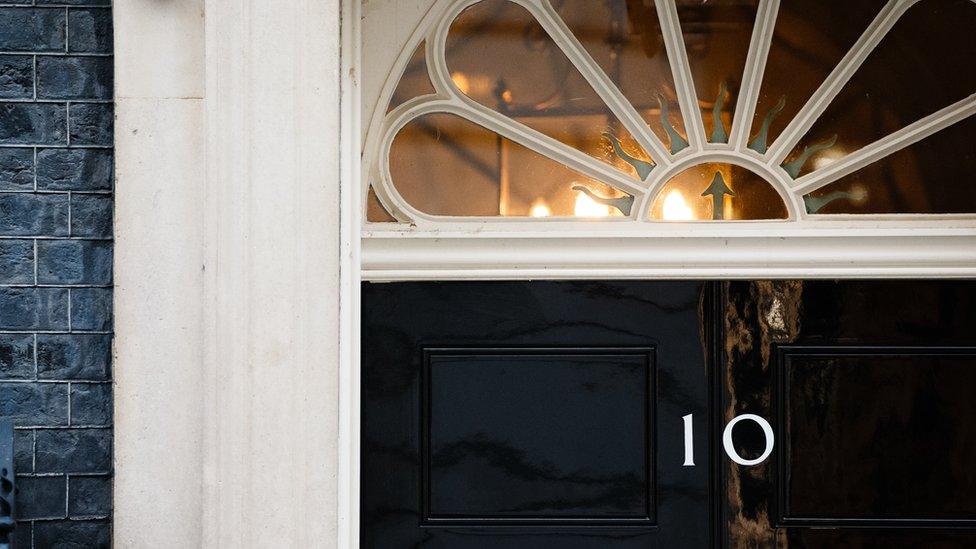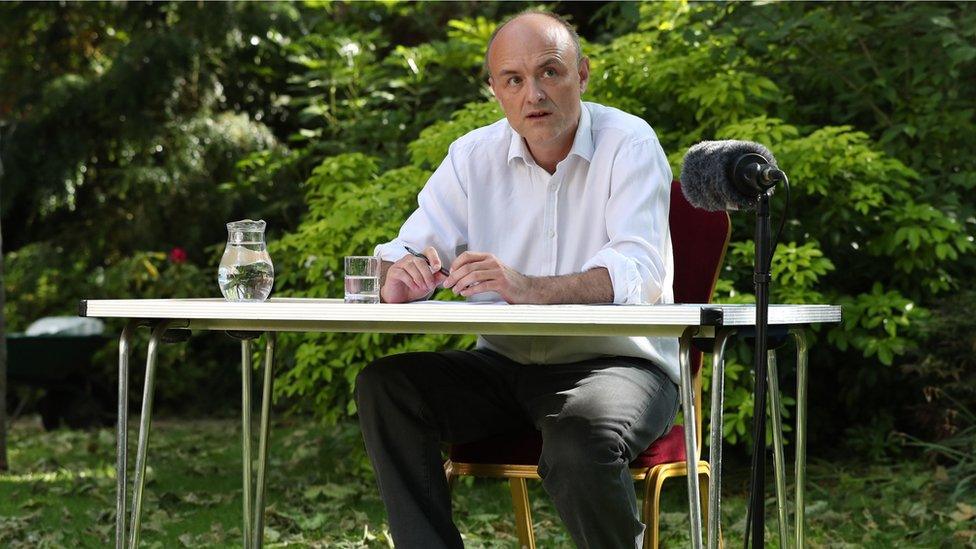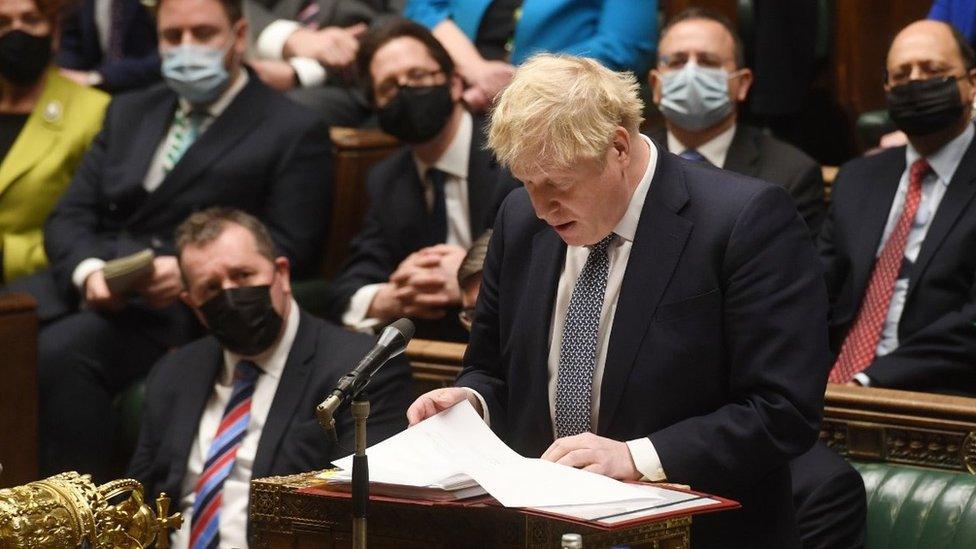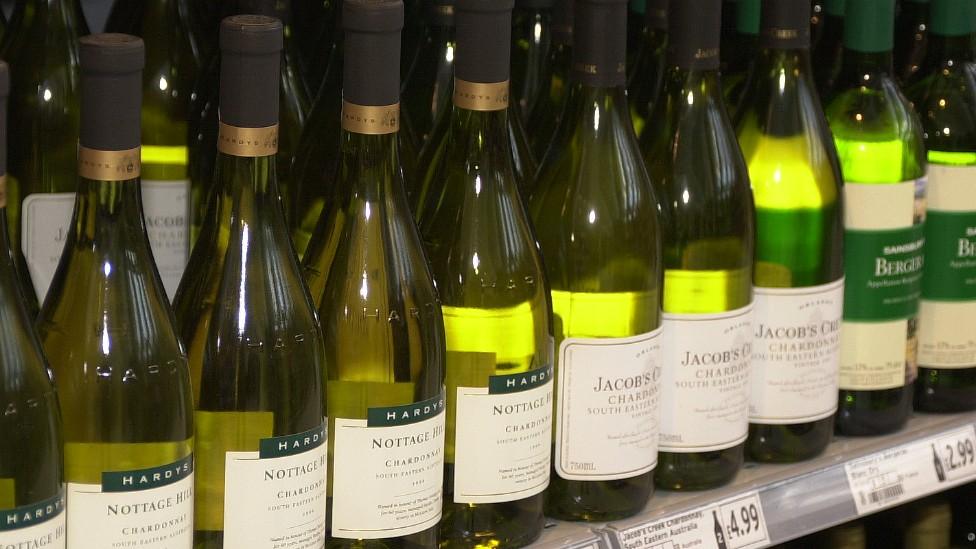Boris Johnson party row: Mixing work and socialising in No 10
- Published

At Prime Minister's Questions, Boris Johnson told MPs that he was technically within the rules when he attended a drinks party in his own back garden on May 20, 2020, during lockdown.
He set out part of the defence he has put forward to the senior civil servant, Sue Gray, who is investigating the allegations of parties taking place on government property.
On Wednesday, the prime minister told MPs: "Number 10 is a big department with the garden as an extension of the office - which has been in constant use because of the role of fresh air in stopping the virus.
"I believed implicitly that this was a work event."
A Downing Street spokesman later provided more of the case for the defence - that the prime minister had not seen the email invite to No 10 staff from civil servant Martin Reynolds, encouraging them to bring their own booze to the event.
But the building - or buildings - in Downing Street also form part of the defence case.
No 10 acts as both a home and an office for the prime minister, although the flat where he lives is actually above No 11 Downing Street.
The higgeldy-piggeldy property is variously a conference centre, a venue for ministerial meetings, a workplace for civil servants and advisers, and - in 2020 - also where press briefings were conducted.
So it's possible the prime minister may be able to claim that if members of his household happened to "mix" with staff when restrictions were in place, that was because they were simply using their own back garden.
And when he was "mixing" with officials that was because the garden was also an office, and those key employees did not need to work from home.
Was it illegal?
But this explanation is rejected by former members of Mr Johnson's own staff.
"I offer my heartfelt apologies": Watch Boris Johnson admit to attending the No 10 party in May 2020
In a tweet on Wednesday, Dominic Cummings argued that 20 May - given the formal e-mail invitation - was "no way within the rules" and was "obviously social, not work", which would not have been allowed.
Another former staffer - who has not, unlike Mr Cummings, been openly critical of the prime minister - told the BBC there were "no legal grounds" for the 20 May gathering.

Downing Street party row
LAURA KUENSSBERG: What next for Johnson after party apology?
REALITY CHECK: What rules did Downing Street party break?
PROFILE: Party investigator Sue Gray
TIMELINE: Alleged government lockdown gatherings

And they noted that while there was a reference to good weather in the emailed invitation, there was no mention of work - and the only nod to the pandemic was that the drinks would be "socially distanced".
Sue Gray will no doubt form her own view - but with more Conservative MPs becoming openly critical of Mr Johnson even before she completes her report, there is little doubt that he is in a tight spot.
A question of culture
Former government insiders are suggesting the culture that was allowed to flourish at Downing Street from the first lockdown onwards contributed to the prime minister's current predicament.
A regular visitor to Downing Street from another department said that drinks were available on some evenings at post-press conference meetings in the garden.
A former No 10 insider has already said drinks were available regularly on Fridays when people were working late.

Dominic Cummings was no stranger to the Downing Street garden
Dominic Cummings has insisted that the photograph, published by the Guardian, external, in the Downing Street garden from 15 May 2020 - showing wine on a table - depicted a work meeting, not a social event.
And he added in his blog, external "No 10 staff were ENCOURAGED" [his caps] to have meetings in the garden April-August for the obvious reason that we were in a pandemic with an airborne disease and being outside was safer!'
This account has been corroborated by others in government at the time who said evidence was emerging of the lower risk of transmission outdoors.
But a former government adviser told the BBC that because people were getting used to meeting outside, the lines between work and socialising had got blurred.
He suggested that this may have "normalised" the drinking and chatting in the garden that took place on 20 May.
But he nonetheless agrees with Mr Cummings that this event - with that email invite from Mr Johnson's Principal Private Secretary Martin Reynolds - was "blatantly against the rules".
And he said several people who worked in No 10 at the time felt Mr Reynolds' email invitation was "nutty".
"Anyone with political nous would know this was wrong," said the former insider.
Speaking with authority
As we reported, the event went ahead despite opposition from key political staff, leading some to believe it must therefore have been sanctioned by the prime minister himself.
But the former government source believes Downing Street's denial of this is credible - again, because of the unusual culture at No 10.
He said that civil servants who are Principal Private Secretaries, like Mr Reynolds, would normally work closely with their ministers,
And it would be assumed that they were speaking with the authority of their political masters.
But in Boris Johnson's case, added our source, "he just isn't across the detail".
So, he claimed, it was left to others in No 10 to undertake functions usually associated with the prime minister himself.
Watch as Sir Keir Starmer asks if the PM will do the decent thing and resign
Labour sources say they haven't asked for Martin Reynolds's resignation as the "culture inside No 10 was set by the man at the top".
So bit by bit, a picture of working life inside No10 during the coronavirus crisis is emerging.
Gray area
The prime minister would prefer to talk of the government's achievements in the face of the challenge of Covid - such as the mass vaccination programme.
But as one of Boris Johnson's MPs put it after Prime Minister's Questions, "it is just drip, drip, drip. It will continue to be drip, drip, drip" - and "partygate" could continue to be politically corrosive.
The key question now will be whether the No 10 defence - that while mistakes were made, rules were not technically broken - will wash with Sue Gray, and with the wider public.
- Published12 January 2022

- Published14 January 2022
